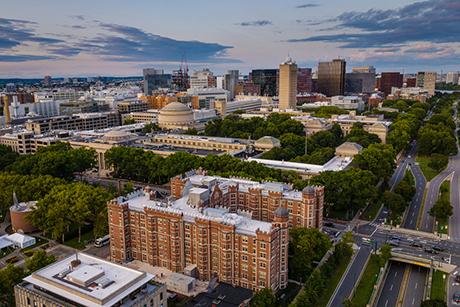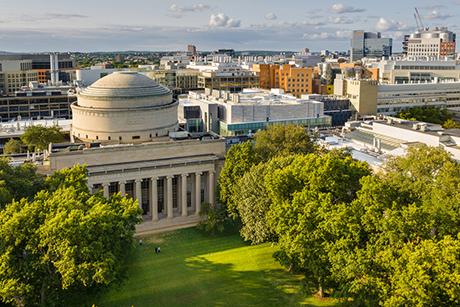Device that recycles vaporized water from power plants wins MIT $100K
The grand prize winner at this year’s MIT $100K Entrepreneurship Competition was an MIT spinout that’s developing a system that captures and recycles vaporized water from thermoelectric power plants. The recycled water can be constantly reused in the plant’s cooling system, saving millions of gallons and dollars annually, or be shipped as potable water to water-scarce areas.
“Four thousand children die every day because they don’t have access to clean water, and the water crisis is only getting worse. … Our mission is to help solve the water crisis and save power plants $10 billion a year,” Maher Damak PhD ’17, a mechanical engineering graduate and co-founder of Infinite Cooling, said in the startup’s winning pitch. The technology was based, in part, on Damak’s graduate thesis.
Two other winners took home cash prizes from last night’s competition, held in the Johnson Ice Rink. The $10,000 Audience Choice award winner was Zilper Trenchless, a team consisting of MIT Sloan School of Management student Daniel Zillante and his brother, Roberto, who are redesigning trenchless pipe installations to cut back on time, costs, and environmental impact.
A $10,000 Booz Allen Hamilton Data Analytics Prize went to Iterative Scopes, which was one of 34 teams that made it into the competition’s semifinal round, but did not pitch last night. The MIT team has developed technology that uses computer vision and machine learning for real-time detection of lesions in the gastrointestinal tract that may indicate colon cancer.
MIT’s largest annual entrepreneurship competition, now in its 29th year, is run by MIT students and supported by the Martin Trust Center for MIT Entrepreneurship and the MIT Sloan School of Management. The competition consists of three separate contests: Pitch, Accelerate, and Launch.
In all, eight finalist teams, including the three prize winners, pitched business ideas to a crowd from MIT and the general public, and to a panel of judges including entrepreneurs and industry experts.
In the United States, about 39 percent (about 160 billion gallons daily) of all freshwater withdrawals — total volume removed from sources such as lakes and rivers — goes to thermoelectric power plants. Typically, water is constantly dumped into evaporative cooling towers, where some water evaporates to cool the remaining water. Vapor is then released out of the top in a plume, sometimes causing regulatory issues. A 250-megawatt power plant, for instance, consumes the same amount of water as 100,000 residential users, and spends $5 million on water, annually.
Infinite Cooling — backed by funding from grants and other startup competitions, including last year’s Clean Energy Prize — has developed a system that can be retrofitted on top of cooling towers, where it captures escaping water vapor. The system also eliminates the need for treating the water with thousands of gallons of chemicals before it’s recycled.
“Because our device is able to collect this pure, recondensed water, not only do we reduce the evaporated losses, but also [reduce] costly water-treatment requirements,” said co-founder and co-inventor Karim Khalil PhD ’17, a mechanical engineering graduate.
During the pitch, the presenters demonstrated a video of a tabletop-sized tower fitted with the device. When it was turned off, a plume of steam rose through the tower unaffected. “However, when we switch our device on, the plume vanishes almost instantaneously and the water begins to collect,” Khalil said, as the rising steam in the video disappeared.
The startup has optimized the geometry and surface chemistry of its collector to capture 80 percent of the liquid water droplets in the air. According to the startup, the device could cut a power plant’s water consumption by 20 to 30 percent.
But the startup has other plans for its technology, beyond saving costs at power plants. “We believe we can have a profound impact on the global water crisis,” Damak said.
As an example, Damak pointed to the city of Cape Town, South Africa, which is currently in the midst of a water shortage caused by drought. The city is currently trying to install desalination plants to provide drinkable water. However, just 15 miles from the city, Damak said, stands a 2-gigawatt nuclear power plant. If the plant equipped Infinite Cooling technology to its towers, he said, it could provide three times more water at a tenth of the cost, compared to water desalination plants.
“More broadly, we believe we can turn every coastal power plant [worldwide] into a low-cost desalination unit, saving $15 billion a year in electricity costs and saving lives,” Damak said.
Commercialization of the technology looks promising, Kripa Varanasi, an associate professor of mechanical engineering and serial entrepreneur, told MIT News after the competition. Many innovations that tackle only water-scarcity issues, he said, can be difficult to market. “But being at energy-water nexus, you know [you have] a customer, a power plant, that uses a lot of water” and welcomes cost savings, he said. “Instead of building new plants, we can use water plants along the coast to solve the water problem … while being profitable.”
Infinite Cooling will put the prize money toward starting a pilot at MIT, hiring talent, and generally building the business, Varanasi said. “The MIT $100K is sort of the king of startup competitions, so it’s really exciting to win this,” he said.
Since its 1990 debut, the MIT $100K has facilitated the birth of more than 160 companies, which have gone on to raise $1.3 billion in venture capital and build $16 billion in market capitalization. More than 30 of the startups have been acquired by major companies, such as Oracle and Merck, and more 4,600 people are currently employed by former competing companies.
This year, 150 teams applied to the entrepreneurship competition from every department at MIT, according to organizers. That number was winnowed to 34 semifinalist teams for the Launch contest. Judges then chose eight finalists to pitch at Monday’s grand finale event. Each of the eight finalists received $10,000. Semifinalist teams all received mentoring, prototyping funds, media exposure, and discounted services.
Keynote speaker was Steven Conine, co-founder and co-chairman of Wayfair, one of the world’s largest e-commerce companies selling home goods. The night’s host was Marc Chalifoux MBA ’16 and managing director of the MIT $100K from 2014 to 2015.


